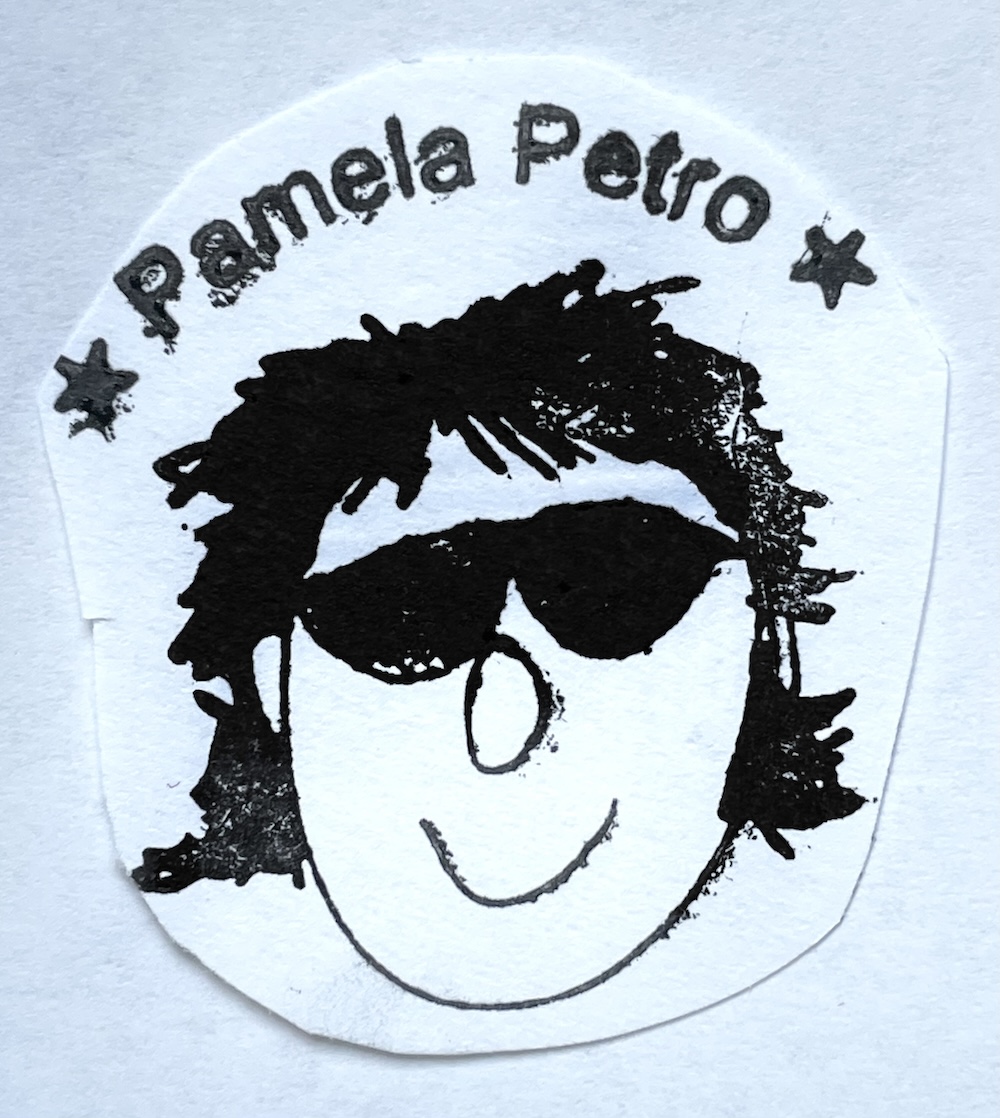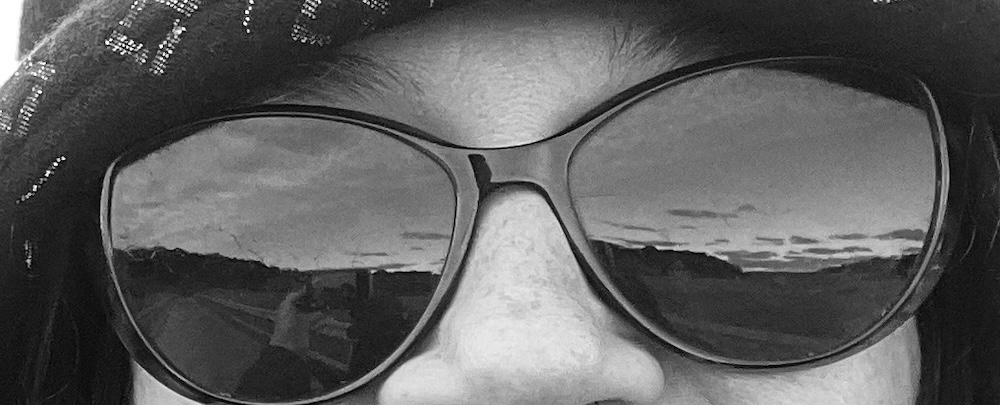Pamela Petro — daughter of Jack Nicholson — pays homage to her sunglasses.
If my house were on fire, I’d put on my sunglasses first, so I wouldn’t misplace them, and then I’d rescue my partner and my dog. Sunglasses would cut down the glare from the flames.
My sunglasses are so essential to me that they’re the key feature of my signature doodle. I use this little scribble so often to sign thank you notes and graded essays that this year, as a gift to myself, I had it made into a stamp, so I don’t have to redraw it over and over.
Best thing I ever did.

I’ve been wearing sunglasses almost as long as I’ve been capable of remembering things. My first for-sure memory is of arriving at my family’s beach rental on Cape Cod. As my parents, Aunt June, and grandparents unpacked the car, I pulled every pot and pan out of the kitchen cabinets. I was probably just out of the crib. It was demanding work, but important work, I thought.
My next memory is of taking my mom’s sunglasses off her face and putting them on mine.
“You look like a movie star!” cried Aunt June.
My mom and Aunt June tried hard to look like actresses in magazines, and I tried hard to look like them. This didn’t mean I followed all their fashion advice. They believed little girls looked “precious” in white anklet socks. Even before I was five, looking precious was a horror to me. While my friends wore anklets in summer with their shorts, I wore dark green, brown, or navy blue woolen knee socks, held up with rubber bands. Photos of us show a bunch of little girls and a short, middle-aged male tourist wannabe with a cute bob.
But the chief requirement of looking like a movie star was not wearing anklets, it was wearing sunglasses, and this was something my mother, aunt and I agreed upon.

I have to tell you that there was a reason I wore sunglasses at night for two weeks in Wales several years ago. I didn’t do it to be the coolest American in Ceredigion. I wore them because I’d flushed my distance glasses down the toilet on the plane. They’d shot out of my pocket, hit the trap with breathtaking accuracy, and vanished in a neat whoosh.
I’d been on a flight from Malta to London. We were directly over the Alps as a flight attendant explained to me that the plane flies the route four times, back and forth, before they pump out the waste tank. Did I, she inquired, still wish to have my glasses back?
I thought for a moment. Was this better or worse than the time I’d swallowed my contacts? It was a toss-up. That time I’d lost my case, come home late at night and put my contacts in the water glass beside my bed, and then drunk them first thing in the morning. On balance, I decided that was worse. I still foresee a surgeon pulling his hand out of my gut someday with a bloody contact on his fingertip, announcing to the operating room, “Ah, here’s the culprit.”
Even without 20/20 vision, I could see the mountain peaks below us. They looked sharp and a little menacing, as if they’d be happy to poke the plane in the belly. No, I said to the flight attendant, British Airways could keep what she referred to as my spectacles. I consoled myself with one thought: Thank God they weren’t my sunglasses.

I was staying in Wales with my friend Menna in the little town of Llandysul, and she’d taken me to a pub the night I’d arrived from Malta. I hated to say it, but I thought the place was dreary. Menna loves bright colors, a bit of dash and sparkle, so why she’d chosen that place was a mystery to me. She was chuckling when she returned from the bar.
“Here you go, my treat,” she announced, planting down two glasses of red wine.
“Menna,” I asked, “is it me, or do you find this place a little grim?”
She let loose a series of hoots that sounded like pigeons escaping from under her tongue. “It’s you. You’re wearing your sunglasses.’
Ah. Right.
She kept chuckling, pleased with herself. “I told the barman that you were Jack Nicholson’s daughter.”
“What? Why on earth would you say that?”
“Because you have an American accent and you’re wearing sunglasses. Doesn’t he wear sunglasses everywhere, even at night?”
This was the start of the second millennium and that’s precisely what Jack Nicholson was doing. She smiled into her wine. “Sunglasses,” she muttered, shaking her head as if they were some kind of immoral American extravagance, like Coca-Cola or Apple computers.
“You and your sunglasses are the most exciting thing to hit Llandysul since they put in the one-way system.”

Do you know the movie, Days of Wine and Roses? A heavy-drinking jerk buys a woman who doesn’t drink a Brandy Alexander, and by the end he’s quit and she’s a raging alcoholic. That’s how it was with sunglasses and my mom, Aunt June and me. They kept up a healthy relationship with sunglasses all their lives. Sunglasses were for movie star glamour and the beach. For much of the year, though, their sunglasses lived in the bottoms of their purses.
Not mine.
I adored my sunglasses. Everything looked better through them! Greens were greener, winter skies looked like July afternoons. Glare disappeared! Adults despised glare, and so did I. Polaroid ads on TV showed a driver blinded by what looked like an atomic bomb explosion, his car careening all over the road. Ordinary sunglasses did nothing to help. But the Polaroids he tried next cut out the glare entirely! And what did they reveal? That he was about to drive head-on into a station wagon.
I didn’t want to drive into a station wagon. I wanted to wear my sunglasses and live.
As a teenager I discovered the first generation of progressives — glasses that got dark on their own when you went outside — and cut down to just one pair. For a while this seemed like a bona fide miracle, until I realized they never got dark enough outside or clear enough inside, where they gave me a malarial glow. Photos with my friends from this period show a bunch of teenage girls and a young mob boss with a ponytail and bow-shaped barrettes.
As I grew up, probably inevitably, I became dependent. If I didn’t wear sunglasses, the white skies of cloudy days felt like a million needles in my eyes. I still routinely wear my sunglasses after I’ve turned on my car’s headlights.

The Chinese invented sunglasses in the 12th century. They made them from the thinnest slabs of smoky quartz that they called ai tai, which means “dark clouds.” I love the idea of wearing glasses that might start to rain at any moment.
I’m aware sunglasses get a bad rap. They tint “reality” the color of swimming pools and grape Kool-Aid. They close the curtains on your face so other people can’t look in. Maybe that’s why hitmen seem to enjoy wearing them so much.
When I started this essay I wrote a lot of shite about the dangers of other people peering into your soul — if you believe eyes are its windows — and how identity is malleable and we can be whoever we want behind our sunglasses. And that may be true, but it’s not very interesting. The fact of the matter is that other people don’t enter the sunglasses equation at all.
I wear sunglasses because the world is too bright for me. And because I prefer the day on the cusp of darkness, when imagination edges out vision. As the day ebbs, all those greener greens and higher contrast blues, yellows, and oranges that sunglasses conjure for us fade to grey. They blend and blur and pool into shadow more quickly than if I’d traded down to my regular glasses. And I love that time.
I love to watch the daylight lessen after the Summer Solstice. I love to take my dog out at night and not turn on the backyard light, so I can play in the dim starlight at sifting tree shadows from the surrounding, paler darkness. Potential and possibilities bloom where flowers don’t. When I was a kid, the shadows hid monsters. Now, visual distractions dimmed away, they’re where wonder lives. Ideas, memories, all kinds of marvels and questions. The darkness is a place where my mind opens up.

A day or two after our pub dinner I walked from Menna’s house to a market in Llandysul to buy her a bottle of wine. As I was debating reds, I noticed two women in the produce section in feverish conversation. At first I thought they were speaking in Welsh, but it was just their strong accents that had thrown me off.
“Well, well, I never! It can’t be true!”
“It is,” insisted a woman holding a cabbage.
“How do you know it’s true?” Practically an accusation.
A third woman showed up trailing a metal grocery cart behind her. “How do you know what’s true?” She pulled the cart around front so she could lean on it.
“Nerys says Jack Nicholson’s daughter is in Llandysul!”
“No! I don’t believe it.”
“It’s true,” insisted the cabbage holder. She was picking at the outer leaves, which were accumulating on the floor. “She was at the pub the other night.”
“How do you know?” asked the woman with the cart.
“You can tell it’s her because she wears her sunglasses at night. Just like her father!”
General noises of the “Well, yes, that makes sense” variety.
“And so, don’t you know, she had them on in the pub the other night with Menna the Poet.”
“Ahhh, well then.” This came in unison and indicated that pretty much everything was explained.
I fought against blowing my cover, but quickly weakened. Whipping my sunglasses off, I approached the group. It wasn’t until I heard my own voice that I realized my American accent would likely give me away.
“Did I hear you say that Jack Nicholson’s daughter is in Llandysul?” I began.
They regarded me with mild interest. “So, you’ve heard she’s here too?” inquired the woman with the cart.
I explained that no, I’d been eavesdropping on them. “Did she look like a movie star’s daughter?” The hope in my voice hung in the air like dirty laundry.
“Oh, no, I heard she was quite plain,” said one of the women. My ego ached.
“But then Jack isn’t a handsome movie star, is he? He’s got charisma instead of looks.” The others murmured agreement. This was contributed by the original questioner. That she was on a first-name basis with “Jack” reminded me of my Aunt June, who used to call Bette Davis “Bet,” as if it were a pet name shared between the two of them. It was years before I realized she was mispronouncing it.
“F. Scott Fitzgerald said that the two top things in the world are animal magnetism and money,” I contributed. “The next best were good looks and intelligence. He had the second pair, but Ernest Hemingway had the magnetism.”
All three looked at me suspiciously, then murmured, “Ta rah,” and ambled off over the cabbage leaves. That I could’ve been Jack Nicholson’s daughter was as far from their thoughts as organizing Llandysul’s first-ever women’s synchronized swimming team.
If only it had been a bit darker in the market. If only they’d been wearing sunglasses.

*
Pamela Petro’s latest book, ‘The Long Field: Wales and the Presence of Absence, a Memoir‘, was shortlisted for the Wales Book of the Year Award (Little Toller, UK, 2021; Arcade Books, US, 2023). She’s writing a new book about hauntings and ghost-making.